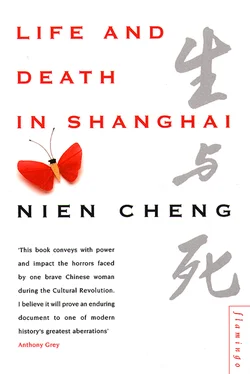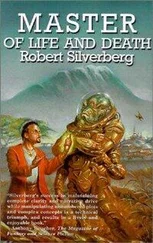‘What has a Cultural Revolution got to do with us? We worked for a commercial firm, not a cultural establishment,’ I said.
‘Chairman Mao has said that everybody in China must take part in the Cultural Revolution,’ Chi said.
They both said rather impatiently, ‘We are late. We must leave at once.’
Chi also stood up. I looked at the carriage clock on the mantelpiece; it was a quarter past eight.
Chen Mah was waiting in the hall with my handbag and a navy blue silk parasol. As I took them from her I smiled but she did not smile back. She was staring at me anxiously, obviously worried.
‘I’ll be back for lunch,’ I tried to reassure her.
She merely nodded.
Lao Chao was there standing beside the open front gate. He also looked anxious, but said nothing, simply closing the gate behind us.
The apprehension of my servants was completely understandable. We all knew that during the seventeen years of Mao Tze-tung’s rule innumerable people had left their homes during political campaigns and had never come back.
There were few people in the streets but the bus was crowded with solemn-looking passengers. It took a circuitous route so that we did not get to our destination until after nine o’clock.
A number of young men and women were gathered in front of the technical school where the meeting was to be held. When they caught sight of us approaching from the bus stop, a few ran into the building shouting, ‘They have come! They have come!’
A man came out and said to my escorts irritably, ‘Why have you been so long? The meeting was called for eight o’clock.’
The two men turned their heads in my direction and said, ‘Ask her!’ before hurrying into the building.
This man now said to me, ‘Come this way.’ I followed him into the meeting room.
The large room was already packed with people. Among those seated on narrow wooden benches in front of the assembly I saw Shell’s physician and other senior members of the staff. The drivers, guards, liftmen, cleaners and clerks sat behind them among a large number of young people who were probably the students of the school. Quite a number stood in the aisles and in the space at the back of the hall. Hot sun streamed into the stifling room through bare windows, but very few people were using their fans. The atmosphere in the room was tense and expectant.
Although we had worked in the same office and seen one another daily for almost nine years, not one of the senior staff greeted me or showed any sign of recognition when I brushed past them to take up the seat allocated to me in the second row. Most of the men averted their glances; the few whose gaze met mine looked deeply troubled.
I wondered what these men had been through in the months since Shell had closed its office. They were the real losers of the ‘Assets Against Liability Agreement’ reached between Shell and the People’s Government agency authorized to take them over. Nearly all the men had been with Shell for a very long time, some since the 1920s. During the Japanese occupation of Shanghai, some of them made the long and arduous journey from Shanghai to the company’s office in the wartime capital of Chungking, abandoning home and family; others remained in the city and suffered great economic hardship rather than work for the Japanese oil company that had taken over Shell’s premises. Most of the men were nearly sixty and approaching retirement. The Agreement specified that they were all to be given jobs in Chinese organizations. What was not mentioned was that they would not be given jobs commensurate with their former positions in Shell but would be employed as clerks or translators at a low rate of pay with much reduced retirement pensions. None of them had dared to oppose the terms of the Agreement since it was what the government wanted them to accept. Both the last general manager and I tried to obtain assurances from the Union chairman, but we were told that every member of our staff was pleased with the terms of the Agreement.
At my last meeting with the Shell Union chairman, he had said to me, ‘Everybody is extremely pleased at the prospect of being freed from the anomalous position of working for a foreign firm. They all look forward to making a contribution to socialism as workers of a government organization.’ That was the official line in which even the Union chairman himself could not possibly have believed. Senior members of the staff who came to my office during those last days would shake their heads and murmur sadly, ‘Mei you fa tze!’ a very common Chinese phrase meaning, ‘Nothing can be done’, or ‘It’s hopeless’, or ‘No way out’, or ‘There’s no solution’.
From nine o’clock to lunch-time, when the meeting might be adjourned, was more than three hours. The room was bound to get a great deal hotter as time went on. I knew I had to conserve energy while waiting for events to speak for themselves. The narrow wooden bench was just as uncomfortable as the one I had sat on during the war in a cave in Chungking while the Japanese planes rained incendiary bombs on the city. Perspiration was running down my face. To get a handkerchief, I opened my bag. I saw that Chen Mah had put in it a small folding fan made of sandalwood with a painting of a peony on silk done by my painting teacher. I took it out and fanned myself to clear the air of the unpleasant odour of packed humanity.
Suddenly there was a commotion at the rear. Several men dressed in short-sleeved shirts and baggy cotton trousers came through the door at the back and mounted the low platform. One of them came forward to a small table covered with a white cloth while the others sat down on the row of chairs behind him. One could no longer assess a man’s station in life by his clothes in China because everybody tried to dress like a proletarian, a word the Chinese translated into wu chan cheh which meant ‘a man with no property’. To look poor was both safe and fashionable for the Chinese people. So, while I could not tell the approximate rank or position of the man in charge of the meeting, I thought he must be an official of the Shanghai Labour Union.
‘Comrades!’ he said, ‘Our Great Leader Chairman Mao has initiated and is now personally directing the Great Proletarian Cultural Revolution. With our Great Helmsman to guide us, we shall proceed to victory without hindrance. The situation is excellent for us, the proletariat!
‘The Great Proletarian Cultural Revolution is an opportunity for all of us to study the Thought of Mao Tze-tung more thoroughly and diligently than ever before so that our political awareness is sharpened. Only then can we truly differentiate between those who are within the ranks of the People and those who are on the side of the Enemy.
‘The enemies of socialism are cunning. Some of them raise the red flag to oppose the red flag, while others present us with smiling faces to cover up their dirty scheme. They cooperate with the imperialists abroad and the capitalist class within to try to sabotage socialism and lead the Chinese people backwards to the misery and suffering of the old days. Should we allow them to succeed? Of course not! No! A hundred times no!
‘It’s seventeen years since the people of Shanghai were liberated. Yet, until recently, foreign firms remained in our city. Their offices occupied prominent locations and their cars sped through our streets. The foreigners and the few Chinese who forgot their national identity and worked with them swaggered around with insolence. We all know these firms were agents of the imperialists, who hoped to continue their exploitation of the Chinese people. We could not tolerate this state of affairs so we have closed their doors and thrown out the foreigners. Most of the Chinese on their staffs have been contaminated and their way of thinking is confused. But we must also recognize the fact that some of them are downright reactionaries. It’s our job to implement our Great Leader Chairman Mao’s policy of educating and reforming them. For several months we have conducted political indoctrination classes for them. But no one can be reformed if he himself does not come face to face with reality and recognize and admit the facts of his own mistakes. Self-criticism and confession are the first steps towards reform. In order to make a real effort at self-criticism, a man must be helped by the criticism of others. Today’s meeting is called to criticize Tao Fung and to hear his self-criticism.
Читать дальше












